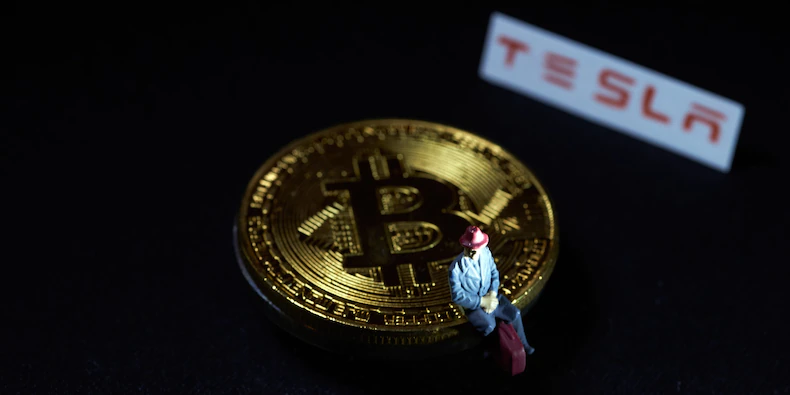
NurPhoto/Getty Images
Elon Musk announced this week Tesla has begun to accept bitcoin as payment for all models of its cars in the US.
From a transactional perspective, the billionaire's crypto-related announcements have been game-changing for bitcoin. That is quite evident from statistics showing crypto-related keyword searches on Google such as "invest in bitcoin" and "how to trade crypto" have seen more than a 1,015% jump in search volume since January alone, according to data from Semrush.
But some crypto experts say this is an unstable choice for Tesla and could deter other companies from following. Here are four main factors that make the cryptocurrency an impractical and costly method of payment for corporates.
With a market cap that now exceeds $1 trillion, bitcoin has quickly acquired a status of being a digital global store of value and reserve asset. But hourly price fluctuations make it extremely volatile, impractical, and a costly payment method for corporates, according to Megan Kaspar, co-founder of crypto investment firm Magnetic. That makes the currency a "poor medium of exchange" and a risky method of payment. Sudden price fluctuations could negatively impact a customer's ability to pay in bitcoin, she said.
A fintech expert said Musk's decision is more like an experiment that will measure potential revenue and client type for his products. This step should be assumed to be one of the automaker's tests for its payment mechanisms, he said.
"Elon Musk is asking people to buy a depreciating asset (a car) with an appreciating, albeit volatile, asset," Luke Sully, CEO at treasury fintech specialist Ledgermatic, said. "The underlying price volatility is the most immediate risk for merchants."
It comes down to how comfortable companies are in accepting a currency that has so much volatility in a single day, Anthony Denier, CEO of Webull, said. "You may see a few companies making the leap, but most companies are fiscally conservative and are not going to jump on a trend like this too quickly," he said.
To ensure transactions go through on crypto networks, a customer is usually charged a "mining", or "network" fee. Now, regardless of the dollar amount transacted, whether carrying a value of $5 or $100, this mining fee is standard for every transaction. The fee varies depending on network demand and currently averages around $20. This element of the payment makes the bitcoin blockchain's fees unsustainable as a form of payment, according to Kaspar.
The Internal Revenue Service adds another layer of complication for merchants that are taxpayers in the US, because it considers bitcoin to be property, not currency, Eric Christensen, chief payment officer of e-commerce firm Digital River, said. "That means when you accept bitcoin, you register the value of it on the transaction date as the basis of that property. When you sell it, you might see a gain or a loss, all of which must be reported to the IRS."
A key challenge at this point is there are only a handful of banks globally that are willing to provide stored digital facilities for the merchants they work with, according to Felix Shipkevich, founder of law-firm Shipkevich PLLC. "Regulation of digital wallets is very grey at this point," he said, adding not many jurisdictions regulate digital wallet usage between merchants and their consumers.